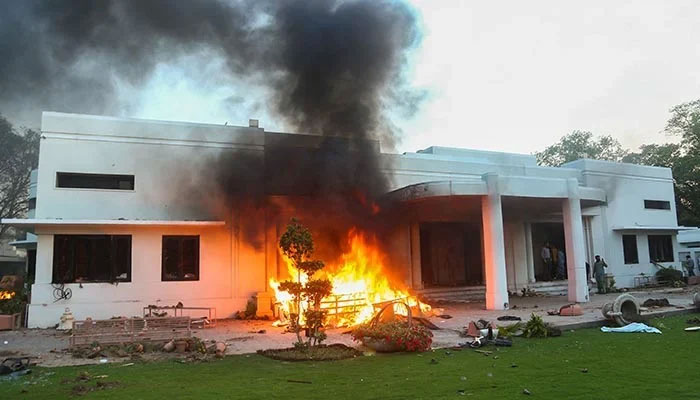Caretaker govt’s cabinet committee report: ‘May 9 was an attempt to incite rebellion within armed forces in favour of PTI’
Report said Imran Khan had long seen military establishment as, both, responsible for his ouster from government and only institution he was open to negotiating with
ISLAMABAD: The caretaker government’s report on May 9 said that it was an organised and dangerous strategy not only to pressurise the Pakistan Army for a political deal to meet Imran Khan’s demands but a brazen attempt to incite rebellion from within the armed forces in PTI’s favour.
“The party had been emboldened by a lack of firm response to its earlier violence by state institutions. A frontal assault on military installations was to weaken the army’s morale and pressure it into political deal making. This was also a brazen and a mistaken attempt at inciting rebellion from within the armed forces in its favour,” says the report. It added, “The events of May 9, 2023 were neither isolated nor entirely spontaneous. They were part of an organised and dangerous strategy to pressure state institutions into acceding to Mr Khan’s demands.”
The report said that the events of May 9, 2023 were the culmination of a narrative built around a personality cult, and a strategy that justified violence against his opponents as national service.
The caretaker government’s cabinet committee, which probed the matter, noted with “profound pain” that a popular political party would elect to hurt national interest through such reckless plans. The Constitution guarantees the right of political association to advance the interests of the people, not to harm state institutions and national interests.
According to the report, “Mr Khan had long seen the military establishment as, both, the entity responsible for his ouster from the government and the only institution he was open to negotiating with. Mr Khan had repeatedly voiced his contempt for other political parties and their leaders and his constant refusal to even sit in Parliament with them. He had also expressed a desire to engage with the military establishment to find political solutions. Mr Khan refused to respect the constitutional role for the armed forces that require them to remain apolitical. He desired active engagement by the armed forces in politics in violation of their constitutional mandate. When the armed forces refused to be dragged into politics, Mr Khan and his party sought to create an environment that would pressure them into engaging with him. This was augmented by a media strategy through local and external platforms. Mr Khan at no point denounced or disowned the May 9 event, rather twisted its facts to widen the divide between the people and the armed forces, nor he has publicly acknowledged the consequences of this event on the national security of Pakistan.
The report said, “A strategy was developed to demonstrate street power by attacking defense installations. This would, at once, allow PTI supporters to vent their anger for the no-confidence motion at the armed forces, and to pressure them into engagement with PTI. This strategy was based on a simple assumption that a clash between unarmed protesters and the military would generate anti-military sentiment, thus creating a gulf between the people and the armed forces. Such a gulf would corner the military into engaging politically and, perhaps, Mr Khan saw himself as a savior capable of bridging such a gulf.”
-
 Dove Cameron Calls '56 Days' Casting 'Hollywood Fever Dream'
Dove Cameron Calls '56 Days' Casting 'Hollywood Fever Dream' -
 Prince William, Kate Middleton ‘carrying Weight’ Of Reputation In Epstein Scandal
Prince William, Kate Middleton ‘carrying Weight’ Of Reputation In Epstein Scandal -
 Timothée Chalamet Compares 'Dune: Part Three' With Iconic Films 'Interstellar', 'The Dark Knight' & 'Apocalypse Now'
Timothée Chalamet Compares 'Dune: Part Three' With Iconic Films 'Interstellar', 'The Dark Knight' & 'Apocalypse Now' -
 Little Mix Star Leigh-Anne Pinnock Talks About Protecting Her Children From Social Media
Little Mix Star Leigh-Anne Pinnock Talks About Protecting Her Children From Social Media -
 Ghislaine Maxwell Is ‘fall Guy’ For Jeffrey Epstein, Claims Brother
Ghislaine Maxwell Is ‘fall Guy’ For Jeffrey Epstein, Claims Brother -
 Timothee Chalamet Rejects Fame Linked To Kardashian Reality TV World While Dating Kylie Jenner
Timothee Chalamet Rejects Fame Linked To Kardashian Reality TV World While Dating Kylie Jenner -
 Sarah Chalke Recalls Backlash To 'Roseanne' Casting
Sarah Chalke Recalls Backlash To 'Roseanne' Casting -
 Pamela Anderson, David Hasselhoff's Return To Reimagined Version Of 'Baywatch' Confirmed By Star
Pamela Anderson, David Hasselhoff's Return To Reimagined Version Of 'Baywatch' Confirmed By Star -
 Willie Colón, Salsa Legend, Dies At 75
Willie Colón, Salsa Legend, Dies At 75 -
 Prince Edward Praised After Andrew's Arrest: 'Scandal-free Brother'
Prince Edward Praised After Andrew's Arrest: 'Scandal-free Brother' -
 Shawn Levy Recalls Learning Key Comedy Tactic In 'The Pink Panther'
Shawn Levy Recalls Learning Key Comedy Tactic In 'The Pink Panther' -
 King Charles Fears More Trouble As Monarchy Faces Growing Pressure
King Charles Fears More Trouble As Monarchy Faces Growing Pressure -
 Inside Channing Tatum's Red Carpet Return After Shoulder Surgery
Inside Channing Tatum's Red Carpet Return After Shoulder Surgery -
 Ryan Coogler Brands 'When Harry Met Sally' His Most Favourite Rom Com While Discussing Love For Verstality
Ryan Coogler Brands 'When Harry Met Sally' His Most Favourite Rom Com While Discussing Love For Verstality -
 Sarah Pidgeon Explains Key To Portraying Carolyn Bessette Kennedy
Sarah Pidgeon Explains Key To Portraying Carolyn Bessette Kennedy -
 Justin Bieber Rocked The World With Bold Move 15 Years Ago
Justin Bieber Rocked The World With Bold Move 15 Years Ago




